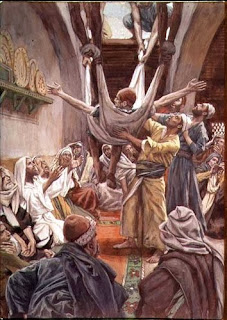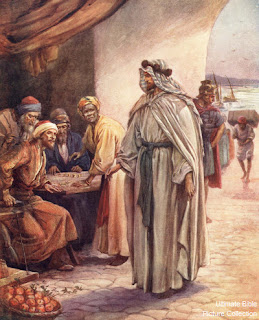"St. Matthew" by Pompeo Batoni
TO CHEW ON: "As Jesus passed on from there, He saw a man named Matthew sitting at the tax office and He said to him, 'Follow me.' So he arose and followed Him." Matthew 9:9
I love Matthew's uncomplicated faith, shown when he dropped everything and followed Jesus. Didn't he have to give this career change some thought? Apparently not. Or maybe he had given it thought, had become increasingly discontented with his job, was aware of Jesus, secretly longed to get to know Him better, and here was his opportunity.
Matthew is an interesting choice as a disciple. The Bible tells us he was a tax collector—one of a class of people who worked for the hated Romans. Tax collectors made their living by charging slightly higher fees than the Romans for general, agricultural, census, and traveler taxes. Licensed tax collectors often hired publicans to do the actual collecting. Publicans, who tacked on additional fees, were usually Jews and doubly despised as tax collectors and traitors.
Matthew was one of these publicans whose booth was beside the road outside Capernaum. In addition to collecting the road tax, he may also have collected taxes from fishermen. Imagine how the career fishermen (Andrew, Peter, James and John) must have felt when this loathed publican joined their band!
However, Jesus knew what He was doing when He chose Matthew. He was probably good with numbers and could read and write. He was well educated in the Scriptures, judging by how much of the Old Testament he had at his fingertips to quote in the Gospel of Matthew.
He also had a missionary bent, shown when he shared his new Rabbi with his friends. Though the book of Matthew doesn't name him as the host of the feast described in our reading, he is named that in Luke 5:29 (actually Luke calls him 'Levi'—another name he went by).
That desire to share Jesus eventually led to his writing of the history of the life of Christ we know as The Gospel According to Matthew. What a legacy!
- It contains the only account of the wise men visit.
- Its detailed account of the Jesus' teachings (called the Sermon on the Mount) is three chapters long (Matthew 5:1-7:29) versus Luke's twenty-nine verses (Luke 6:20-49).
- It contains parables of the Day of Judgment found in no other gospel (Matthew 24)
- It emphasizes Jesus as the fulfillment of Old Testament prophecy.
- It stresses that Jesus was Messiah.
- It depicts Him as King.
The story of Matthew should give all of us hope. For when Jesus calls us, He sees right through our family and job categories. He is not influenced by the labels others put on us or we put on ourselves. When He says "Follow Me" and we jump up and follow Him, we set out on the road to discover a potential and a destiny we never dreamed possible.
PRAYER: Dear God, thank You for Matthew (Levi), a tax collector who became the writer of a history that has influenced millions. Help me to trust You with my future like he trusted You with his. Amen.
MORE: The Feast of St. Matthew
Today the church celebrates the Feast of St. Matthew. The liturgy for the day begins with the following collect:
"We thank you, heavenly Father, for the witness of your apostle and evangelist Matthew to the Gospel of your Son our Savior; and we pray that, after his example, we may with ready wills and hearts obey the calling of our Lord to follow him; through Jesus Christ our Lord, who lives and reigns with you and the Holy Spirit, one God, now and for ever. Amen."
Sources:
- "The Gospel According to Matthew - Introduction," New Spirit-Filled Life Bible
, pp.1287-1289.
- Illustrated Manners and Customs of the Bible
, J. I. Packer, M. C. Tenney, editors, pp. 529-531.



